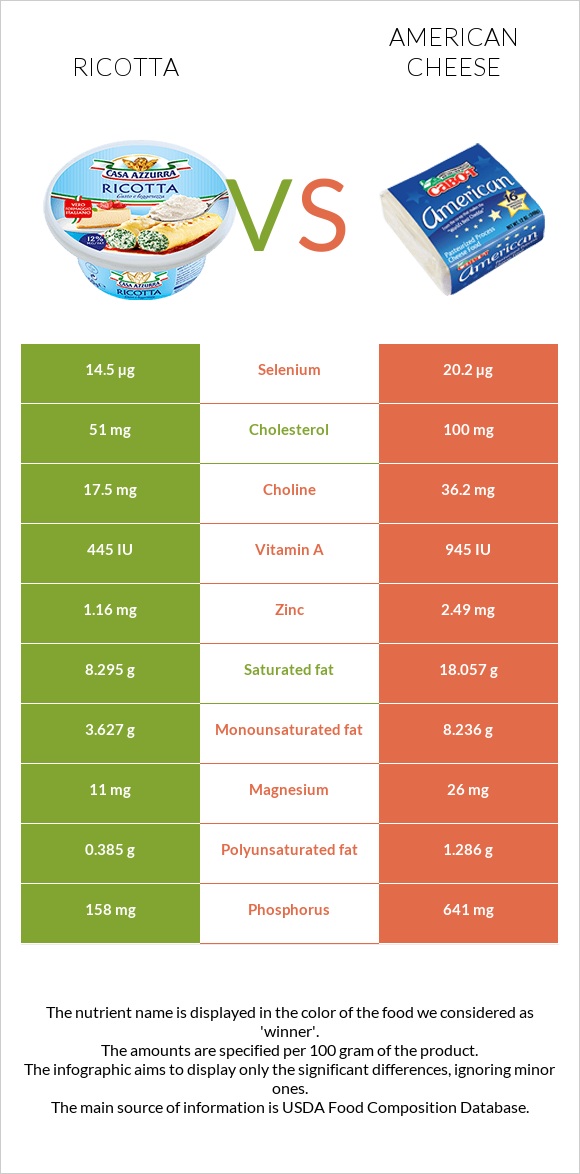Ricotta vs. American cheese — In-Depth Nutrition Comparison
Compare
How are ricotta and American cheese different?
- American cheese has more calcium, phosphorus, vitamin B12, zinc, selenium, and vitamin A than ricotta.
- Daily need coverage for calcium for American cheese is 84% higher.
- Ricotta has less cholesterol.
Cheese, ricotta, whole milk and Cheese, pasteurized process, American, without added vitamin D are the varieties used in this article.
Infographic

Infographic link
Mineral Comparison
Mineral comparison score is based on the number of minerals by which one or the other food is richer. The "coverage" charts below show how much of the daily needs can be covered by 300 grams of the food.
| Contains less SodiumSodium | -95% |
| Contains more MagnesiumMagnesium | +136.4% |
| Contains more CalciumCalcium | +404.8% |
| Contains more PotassiumPotassium | +25.7% |
| Contains more IronIron | +65.8% |
| Contains more CopperCopper | +119% |
| Contains more ZincZinc | +114.7% |
| Contains more PhosphorusPhosphorus | +305.7% |
| Contains more ManganeseManganese | +583.3% |
| Contains more SeleniumSelenium | +39.3% |
Vitamin Comparison
Vitamin comparison score is based on the number of vitamins by which one or the other food is richer. The "coverage" charts below show how much of the daily needs can be covered by 300 grams of the food.
| Contains more Vitamin B3Vitamin B3 | +36.8% |
| Contains more FolateFolate | +50% |
| Contains more Vitamin AVitamin A | +108.3% |
| Contains more Vitamin EVitamin E | +627.3% |
| Contains more Vitamin DVitamin D | +200% |
| Contains more Vitamin B1Vitamin B1 | +15.4% |
| Contains more Vitamin B2Vitamin B2 | +20% |
| Contains more Vitamin B5Vitamin B5 | +89.2% |
| Contains more Vitamin B6Vitamin B6 | +25.6% |
| Contains more Vitamin B12Vitamin B12 | +341.2% |
| Contains more Vitamin KVitamin K | +136.4% |
All nutrients comparison - raw data values
| Nutrient |  |
 |
DV% diff. |
| Calcium | 207mg | 1045mg | 84% |
| Phosphorus | 158mg | 641mg | 69% |
| Sodium | 84mg | 1671mg | 69% |
| Vitamin B12 | 0.34µg | 1.5µg | 48% |
| Saturated fat | 8.295g | 18.057g | 44% |
| Fats | 12.98g | 31.79g | 29% |
| Cholesterol | 51mg | 100mg | 16% |
| Protein | 11.26g | 18.13g | 14% |
| Vitamin A | 120µg | 250µg | 14% |
| Zinc | 1.16mg | 2.49mg | 12% |
| Monounsaturated fat | 3.627g | 8.236g | 12% |
| Calories | 174kcal | 371kcal | 10% |
| Selenium | 14.5µg | 20.2µg | 10% |
| Polyunsaturated fat | 0.385g | 1.286g | 6% |
| Vitamin E | 0.11mg | 0.8mg | 5% |
| Magnesium | 11mg | 26mg | 4% |
| Vitamin B5 | 0.213mg | 0.403mg | 4% |
| Iron | 0.38mg | 0.63mg | 3% |
| Copper | 0.021mg | 0.046mg | 3% |
| Vitamin B2 | 0.195mg | 0.234mg | 3% |
| Choline | 17.5mg | 36.2mg | 3% |
| Vitamin D | 10 IU | 23 IU | 2% |
| Vitamin D | 0.2µg | 0.6µg | 2% |
| Manganese | 0.006mg | 0.041mg | 2% |
| Potassium | 105mg | 132mg | 1% |
| Vitamin B6 | 0.043mg | 0.054mg | 1% |
| Vitamin K | 1.1µg | 2.6µg | 1% |
| Folate | 12µg | 8µg | 1% |
| Net carbs | 3.04g | 3.7g | N/A |
| Carbs | 3.04g | 3.7g | 0% |
| Sugar | 0.27g | 2.26g | N/A |
| Vitamin B1 | 0.013mg | 0.015mg | 0% |
| Vitamin B3 | 0.104mg | 0.076mg | 0% |
| Trans fat | 1.144g | N/A | |
| Tryptophan | 0.125mg | 0.232mg | 0% |
| Threonine | 0.517mg | 0.772mg | 0% |
| Isoleucine | 0.589mg | 0.938mg | 0% |
| Leucine | 1.221mg | 1.716mg | 0% |
| Lysine | 1.338mg | 1.516mg | 0% |
| Methionine | 0.281mg | 0.475mg | 0% |
| Phenylalanine | 0.556mg | 0.939mg | 0% |
| Valine | 0.692mg | 1.187mg | 0% |
| Histidine | 0.459mg | 0.546mg | 0% |
| Omega-3 - EPA | 0g | 0.012g | N/A |
| Omega-3 - DHA | 0g | 0.006g | N/A |
| Omega-3 - ALA | 0.137g | N/A | |
| Omega-3 - DPA | 0g | 0.021g | N/A |
| Omega-3 - Eicosatrienoic acid | 0.001g | N/A | |
| Omega-6 - Gamma-linoleic acid | 0.001g | N/A | |
| Omega-6 - Dihomo-gamma-linoleic acid | 0.033g | N/A | |
| Omega-6 - Eicosadienoic acid | 0.009g | N/A | |
| Omega-6 - Linoleic acid | 0.79g | N/A |
Macronutrient Comparison
Macronutrient breakdown side-by-side comparison
Protein:
11.26 g
Fats:
12.98 g
Carbs:
3.04 g
Water:
71.7 g
Other:
1.02 g
Protein:
18.13 g
Fats:
31.79 g
Carbs:
3.7 g
Water:
39.61 g
Other:
6.77 g
| Contains more WaterWater | +81% |
| Contains more ProteinProtein | +61% |
| Contains more FatsFats | +144.9% |
| Contains more CarbsCarbs | +21.7% |
| Contains more OtherOther | +563.7% |
Fat Type Comparison
Fat type breakdown side-by-side comparison
Saturated fat:
Sat. Fat
8.295 g
Monounsaturated fat:
Mono. Fat
3.627 g
Polyunsaturated fat:
Poly. Fat
0.385 g
Saturated fat:
Sat. Fat
18.057 g
Monounsaturated fat:
Mono. Fat
8.236 g
Polyunsaturated fat:
Poly. Fat
1.286 g
| Contains less Sat. FatSaturated fat | -54.1% |
| Contains more Mono. FatMonounsaturated fat | +127.1% |
| Contains more Poly. FatPolyunsaturated fat | +234% |


